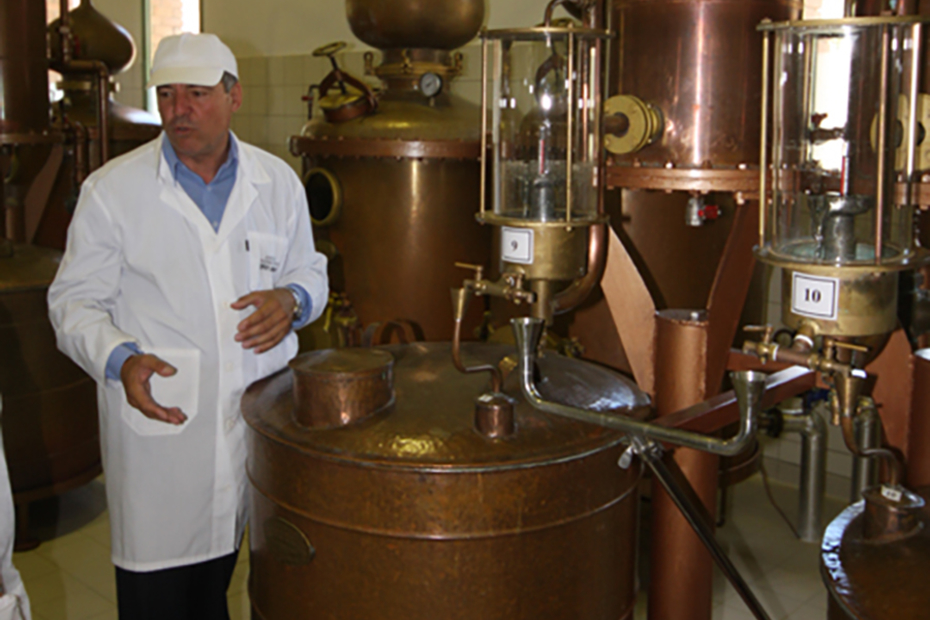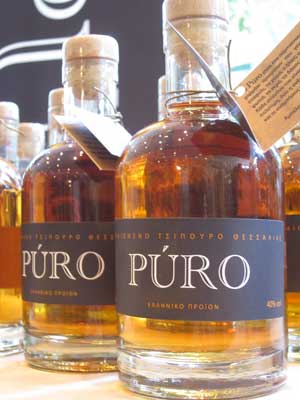Tsipouro, the Greek grape distillate, just went upmarket.
Many of you may have sampled tsipouro, or its cousins, the Cretan raki and tsikoudia, on visits to Greece or in Greek homes. It’s our “fire water,” the Greek answer to grappa, a grape distillate that Greeks have been making and enjoying for generations.
Traditional Greek grape distillates, like grappa, are clear. They are offered as either an aperitif or a digestive. Tsipouro traditionally is the drink you offer someone when welcoming them into your home. It’s what restaurants often serve you as part of the cover. On Crete, it is the vehicle for every social interaction.
In the last few years, it’s has gone from a rough-around-the-edges, knock-your-socks-off kind of drink to a refined, delicious, smooth elixir. Distillers have long been producing tsipouro from single varietal grapes, showing off the unique aromatic qualities of varieties such as Muscat, Xynomavro and more.
Now, they have taken the art of distilling a step further, by barrel-aging tsipouro. At the recent trade show, “Oinopnevmata,” (translation: “Distillations”) here in Athens, several artisan producers, mainly from Northern Greece, where tsipouro is a longstanding tradition, had samples of barrel-aged tsipouro.
I liked them all, but one in particular stood out, the Púro, by veteran wine professional Thanassis Karathanou. (He worked for Tsantalis, one of the largest Greek wine makers, for years.)
Thanassi, like many Greeks over the last few years, moved back to his native town, karditsa, in mainland Greece. There, in an enclave near lake Plastira, he and his wife own and operate a luxury pension called Kazarma. He planted his vineyard, Hilia Klimata (A Thousand Vines”)years ago, makes wine for his own consumption, but turns most of it into tsipouro, which he barrel ages. His preferred varietal is a local Muscat called Mavro Moschato (“Black Muscat”). “The grape is very aromatic, but it doesn’t contain the phenoles necessary to make really good red wine, wine with body. I make the best wine I can, and distill the residuals [crushed grapes], as well as add some wine to that before distilling.”
Púro is delicious. It’s smooth and very aromatic, with a light, sweet fruitiness that really does evince the flavor of this particular grape. The hint of smoke is evident, too. He ages it it in charred oak barrels for five years.
He recommends it as a drink to pair with desserts and, in fact, served it with a local spoon sweet, retseli, which is pumpkin preserved in grape must syrup (petimezi). It’s great with dried fruits, with fine, dark chocolate, and with sweets that are flavored with coffee, such as tiramisu. But the smokey, amber-colored distillate also goes great with smokey, savory things, such as smoked trout and another new product on the Greek market, smoked botargo (from the Stefos Family in Mesolongi).
“You can serve it on the rocks, and even experiment with it in cocktails, mixing it with acidic partners,” says Karathanos.
It retails in Greece at fine wine and spirits shops for about 25 euro. I am planning to bring it to a few friends in the mixology business stateside! For information: Natura SA +30 24413 01351








